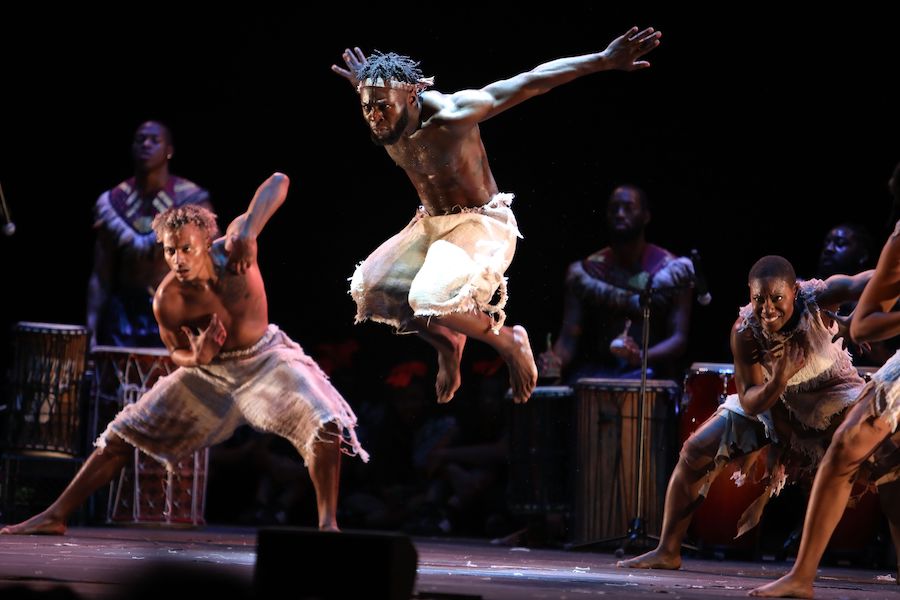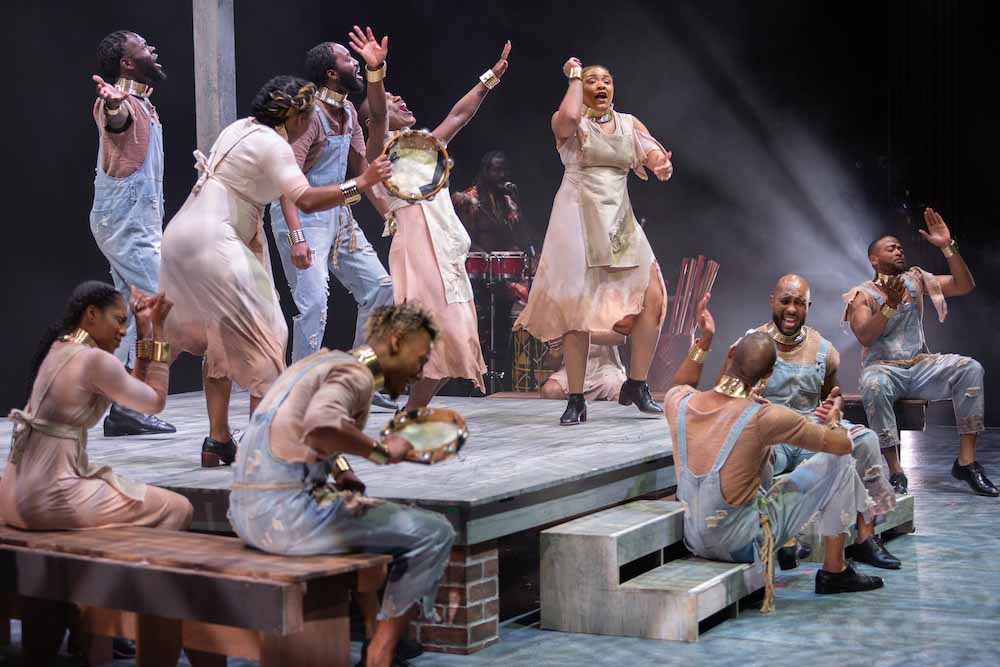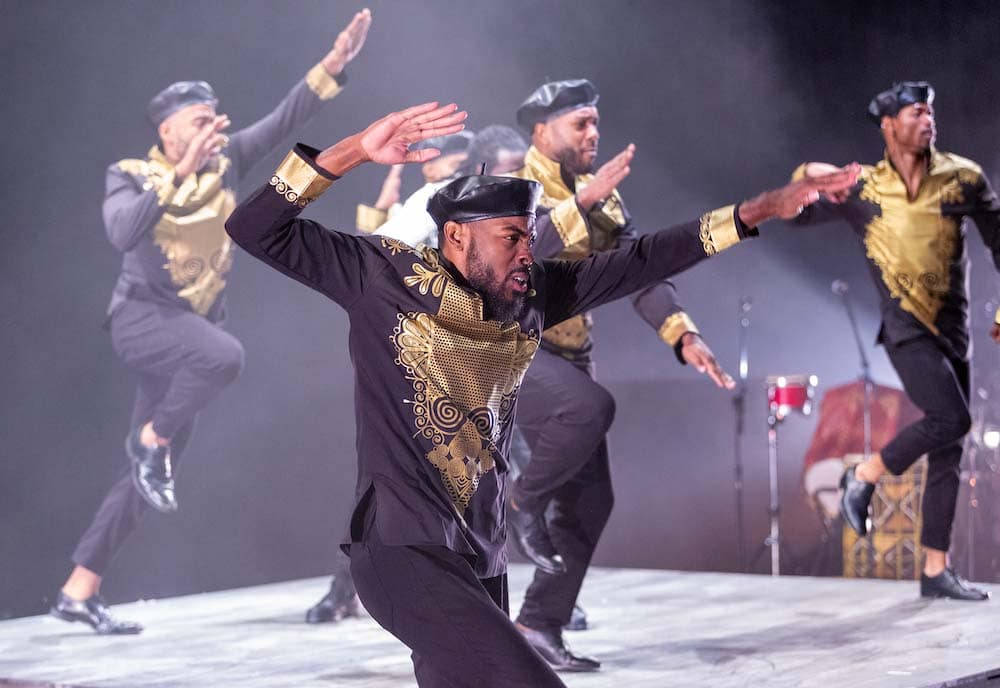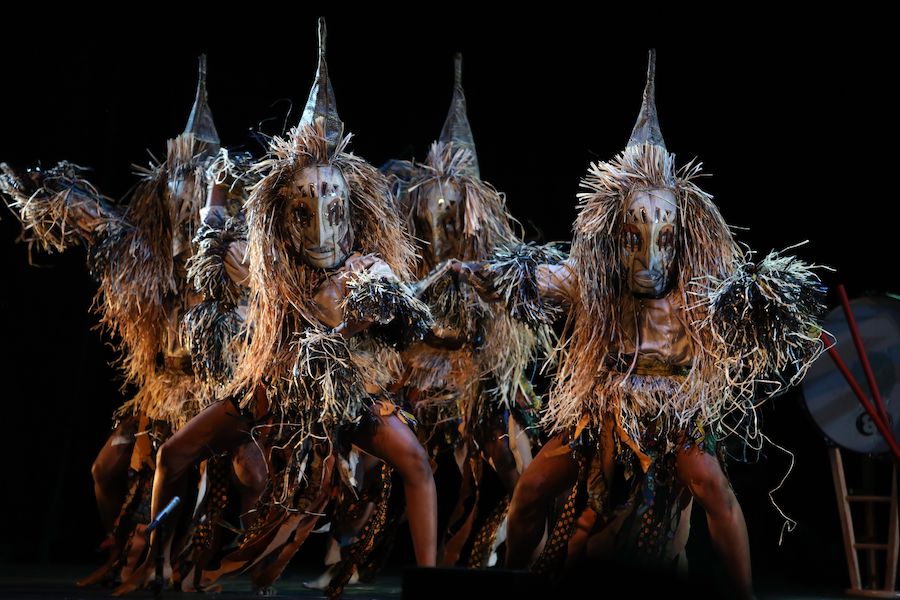If you have ever seen the theater/dance company Step Afrika!, you know it is distinctive. It makes points that are clear, commanding, imperative, poignant, sassy, vibrant, and colorful. Always colorful.
Step Afrika!’s latest production, Drumfolk, just opened at Arena Stage, and as always, the dancing is fiery and superbly executed. More important, the production’s whole reason for being tells a story that not enough people have heard, about two 18th-century events.

The first event occurred in 1739, an uprising known as the Stono Rebellion. As the founder of Step Afrika!, C. Brian Williams, has written: this “revolt, initiated by twenty enslaved Africans in the then-British colony of South Carolina, is one of the largest rebellions organized by Africans in the ‘New World.’ Africans used their drums as a call for action, leading a fight for freedom that would spark fear throughout the colonies.”
Not long after the Stono Rebellion, the leaders of South Carolina established the Negro Act of 1740. This act was designed to keep Africans from achieving any true freedom. Since Stono ended with 25 white men killed, there was bound to be a price to pay. And it was as draconian as possible. Africans were not allowed to use drums to signal one another about impending attacks. They were not allowed to use musical instruments for celebratory purposes. In addition, the law “prohibited enslaved African people from growing their own food, learning to read, moving freely, assembling in groups, or earning money.”
Drumfolk begins in the setting of a church, one of the only places where enslaved Africans could express their fears and shout their determination to be free. Above a simple, raised wooden platform that serves as the stage, a schematic outline of a church hangs in the air. This is the Praise House, a simple clapboard structure where the enslaved could worship and hold community meetings.

After the introduction to this place, the play is divided into five sections. The first, “Drumfolk20” (choreography by David Pleasant, Jakari Sherman, Jeeda Barrington, and Mfoniso Akpan), expresses the meaning of “drumfolk” as “a people who created rhythm with their bodies, giving rise to new American movement practices like ring shout, tap, hambone and stepping.”
The second movement, called “In the Wilderness” (choreography by Ronnique Murray and Dustin Praylow), shows the enslaved meeting under cover of night, planning secretly how to resist South Carolina’s rulers.
The third section is called “Stono” (choreography by Jakari Sherman, Jordan Spry, Mfoniso Akpan, and Julio Leitão). It continues the confrontation between the enslaved community and the rulers of South Carolina.
The fourth section of Drumfolk is called “Un/Afraid” (choreography by Jakari Sherman with contributions from Jeeda Barrington, Conrad Kelly, and Dustin Praylow). It examines the consequences of the quashed rebellion, from the Negro Act of 1740 to the present day. It responds to the devastating efforts of the rulers of America to squelch the strongest and proudest elements of Black life.
The final part of Drumfolk is titled “Free” (choreography by Jakari Sherman). It celebrates the way that although the drum may have been taken away temporarily, it remains, along with the stamping stick, shaping rhythms of Africans who arrived in America even before 1619.

Kenaan M. Quanderr’s stunning costume design creates a broad spectrum of textures and colors. In one scene, men and women are dressed in black outfits decorated with gold designs, their hats black and gold as well. In another scene, the men and women are all dressed in white as they sing a song of praise.
Marianne Meadows’s lighting design uses a variety of patterns and colors on the playing floor and strips of tiny, brightly colored lights — reds, blues, oranges — circling the stage.
Jakari Sherman’s direction keeps the focus of the play moving quickly from one character to another and one event to another. In all its work, Step Afrika! blends a wide variety of sources: African dances and dance styles practiced by historically African American fraternities and sororities in American colleges and universities. In Drumfolk, too, Sherman introduces plenty of modern and African influences.

Erik Teague has created massive masked puppets, made of colorful leggings and spangled faces of straw, designed to show what terrifying characters the enslaved imagined in their nightmares. Steven M. Allen is the composer for this play, and he has created a delightfully kaleidoscopic blend of new work, familiar hymns, and spirituals.
The final point of Drumfolk is that it may have been slave traders’ goal to wipe out the drum in the 18th century, but its percussive sound remains today in so many forms of dancing — stepping, beatboxing, West Coast and East Coast hip hop, and the Brazilian martial art of capoeira — that it is clear that the human body will never be without its drum.
An exciting announcement was made on opening night at Arena Stage: Drumfolk is the first of three productions between Arena Stage and Step Afrika! — the beginning of a multi-year collaborative partnership between the two organizations.
Running Time: About 90 minutes, including one 15-minute intermission.
Drumfolk plays through June 26, 2022, on the Fichandler Stage at Arena Stage, 1101 Sixth Street SW, Washington, DC. Tickets ($56–$72 weekdays; $76–$95 weekends) may be purchased online, by phone at 202-488-3300, or at the Arena Stage sales office Tuesday through Saturday from noon until 8 p.m. For information on programs such as pay-your-age tickets, student discounts, Southwest Nights, and hero’s discounts, visit arenastage.org/tickets/savings-programs.
The Drumfolk program is online here.
COVID Safety: Proof of vaccination against COVID-19 and photo identification must be shown to enter the building and masks must be worn in the building. Arena’s complete safety protocols are here.
Drumfolk by Step Afrika!
Directed by Jakari Sherman
C. Brian Williams, Founder & Executive Producer
Mfoniso Akpan, Artistic Director
Conrad R. Kelly II and Jordan Spry, Assistant Artistic Directors
Steven M. Allen, Composer
Kenaan M. Quander, Costume Designer
Erik Teague, Mask Designer
Marianne Meadows, Lighting Designer
Patrick Calhoun, Sound Designer
Danielle McBride, Sound Engineer
Kendall Arin, Stage Manager
CAST: Christylez Bacon, Emanuel “Manny” Chacon, Agyei Keita Edwards, Dionne Eleby, Kayshon Hawkins, Akievia Hickman, Jabari Jones, Conrad R. Kelly II, Abdou Muhammad, Ayana (Reed) Ogunsunlade, Dustin Praylow, Anesia Sandifer, Joel Santiago, Jakari Sherman, Valencia Odeyka, Emonni Springer, Jordan Spry, Pelham Warner, Robert Warnsley, Kanysha Williams
SEE ALSO:
Step Afrika!’s exuberant ‘Drumfolk’ makes DC debut at Strathmore (review of the production March 7, 2022, by Debbie Minter Jackson)
‘The Migration: Reflections on Jacob Lawrence’ at Step Afrika! (review of Step Afrika!’s previous feature-length work June 9, 2018, by John Stoltenberg)




